Struggling to light up your outdoor arena for an event? Poor lighting can ruin the atmosphere and safety. Let’s solve this problem with the right LED floodlights.
To light an outdoor arena, use high-power LED floodlights with appropriate beam angles. Position them on high poles around the perimeter to ensure uniform, glare-free illumination. Always choose fixtures with a high IP rating, like IP65 or higher, for durability against weather.
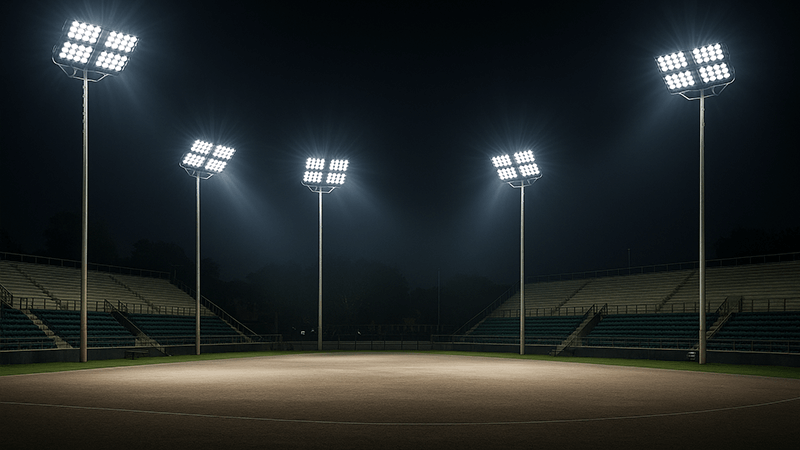
I’ve seen many projects succeed or fail based on their lighting choices. The right setup isn’t just about brightness; it’s about creating a safe and memorable experience. Let’s get into the details to make sure your next event is a brilliant success. You need to consider many factors.
How many lumens for a horse arena?
Planning a horse arena? Inadequate lighting can be dangerous for riders and horses. Let’s pinpoint the exact lumens you need for safety and performance.
For a horse arena, you generally need 30 to 50 lumens per square foot (or 300 to 500 lux). A standard dressage arena might require 150,000 to 250,000 lumens in total. This ensures clear visibility for both training and competition events.
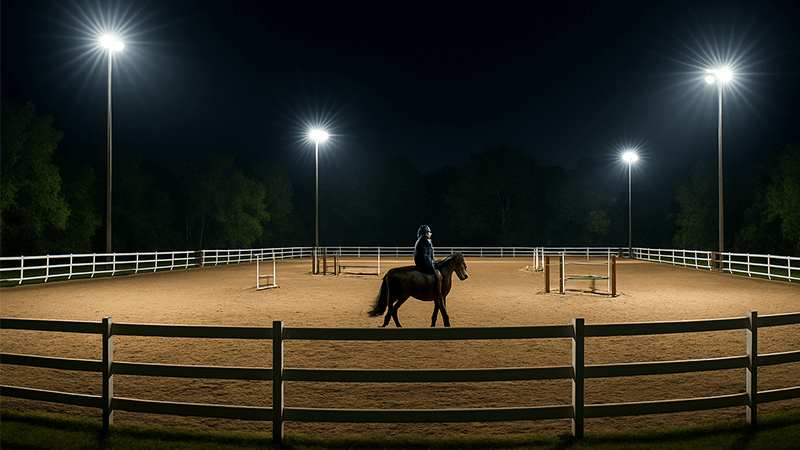
When I work with clients like Shaz, who manage large-scale projects, the first question is always about brightness. For a horse arena, this is extremely important. Shadows or dark spots can spook a horse, which is a serious safety risk. So, we need to get the lighting just right. The key is not just the total lumens but also the uniformity of the light, which we call lux. Lumens measure the total light output from a source, while lux measures the amount of light that actually lands on a surface.
Calculating Your Needs
The exact number of lumens depends on the size of the arena and what it’s used for. A an arena used for casual training needs less light than one used for professional competitions. I always recommend my clients map out their specific needs first. For example, a client in the UAE wanted to light a professional show jumping arena. We calculated based on television broadcast standards, which require much higher lux levels.
Here is a simple table to give you a basic idea:
| Arena Type |
Common Size |
Recommended Lux (Training) |
Recommended Lux (Competition) |
| Dressage |
20m x 60m |
200-300 lux |
500+ lux |
| General Riding |
30m x 50m |
150-250 lux |
400+ lux |
| Show Jumping |
40m x 70m |
300-400 lux |
500-750 lux |
Beyond the Numbers
Remember, these are just starting points. The mounting height of the lights and the beam angle of the floodlights also play a big role. Taller poles allow for wider beam angles and better coverage with fewer fixtures, but they might require higher lumen fixtures to achieve the desired lux on the ground. It’s a balance we have to find for every unique project to ensure a safe, well-lit environment.
Do you have to use an earth wire when wiring a LED flood light?
Worried about electrical safety with outdoor lighting? Incorrect wiring is a serious risk. Let’s clarify the essential role of the earth wire for your protection.
Yes, you must use an earth wire when wiring an LED floodlight, especially for outdoor metal-cased fixtures. It’s a critical safety feature that protects against electric shock by providing a path for fault current to the ground, preventing the fixture’s casing from becoming live.
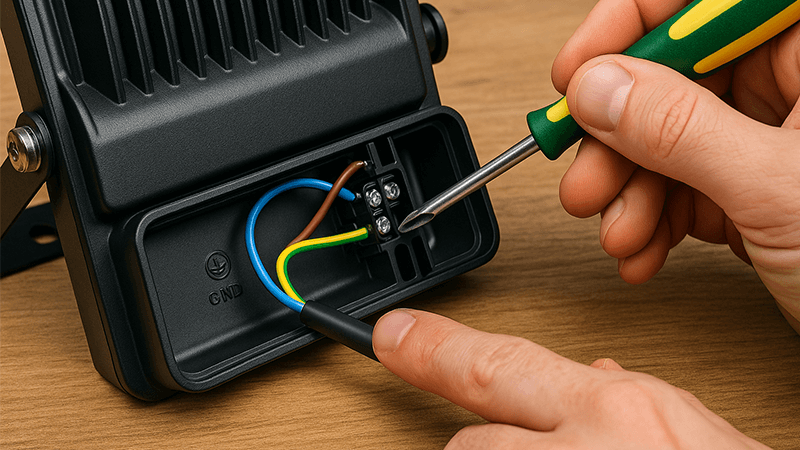
I cannot stress this enough: safety is the number one priority in any lighting installation. I once visited a site where the contractor skipped the earth wire to save time. A few months later, a power surge during a storm caused a massive failure, and several fixture casings became energized. Luckily, no one was hurt, but it could have been a tragedy. The earth wire, also known as the ground wire, is a non-negotiable part of the setup.
How it Works
Most high-power outdoor LED floodlights have a metal housing. These are classified as Class I appliances. Here is what that means:
- Class I Appliances: These protect the user from electric shock with a combination of basic insulation and an earth connection. If the basic insulation fails and a live wire touches the metal casing, the earth wire provides a safe path for the electrical current to flow to the ground. This surge in current will trip a circuit breaker or blow a fuse, cutting off the power immediately.
- Class II Appliances: These are "double insulated" and do not require an earth connection because they are designed so that no single failure can result in dangerous voltage becoming exposed. You usually see this in products with plastic casings, not in high-power outdoor floodlights.
The Risks of Skipping It
Not using an earth wire on a Class I floodlight creates serious dangers.
| Risk |
Description |
| Electric Shock |
If a fault occurs, the metal body of the floodlight can become live. Anyone who touches it could receive a severe or fatal electric shock. |
| Fire Hazard |
A fault current without a path to the ground can cause overheating in wires and components, which can easily start a fire. |
| Equipment Damage |
Power surges or faults can damage the floodlight’s internal components, like the LED driver, without the protection of a proper ground connection. |
For any project, especially in public arenas, all wiring must be done by a qualified electrician who follows local electrical codes. It’s a simple step that ensures the safety of everyone using the space.
Do you need special LED lights for outside?
Thinking of using standard lights for your outdoor project? Indoor fixtures can fail quickly outside. Let’s explore why outdoor-specific LEDs are absolutely necessary for reliability.
Yes, you need special LED lights designed for outside use. Outdoor lights must have a high IP (Ingress Protection) rating, like IP65 or higher, to withstand dust, rain, and humidity. They also need durable materials and better heat dissipation to handle temperature changes.
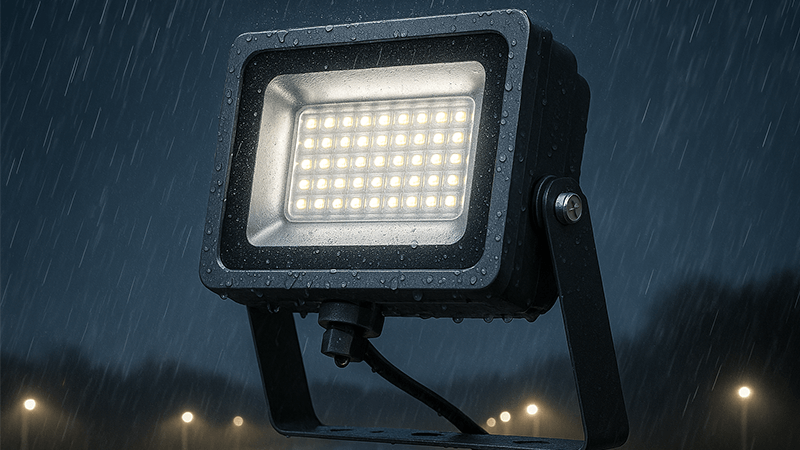
This is a point where I see a lot of purchasing managers try to cut costs, and it almost always backfires. An indoor light fixture simply isn’t built to survive outdoors. The biggest enemy is water. Rain, snow, and even high humidity can get inside a poorly sealed fixture, causing short circuits, corrosion, and complete failure. That is why the IP rating is the most important specification for outdoor lighting.
Understanding IP Ratings
I always tell my clients to look for a minimum of IP65. The IP rating has two numbers.
- The first digit relates to protection against solids like dust. A ‘6’ means it’s completely dust-tight.
- The second digit relates to protection against liquids. A ‘5’ means it’s protected against jets of water from any direction. This is good enough for most rain and weather conditions. For areas with pressure washers or extreme conditions, IP66 or IP67 might be better.
Built to Last Outside
But it’s not just about the IP rating. The materials used are also very different. At our factory, we know that outdoor fixtures face constant challenges from the environment.
| Feature |
Indoor LED Fixture |
Outdoor LED Fixture |
| IP Rating |
Typically IP20 (no water protection) |
IP65 or higher (water and dust proof) |
| Housing Material |
Often plastic or thin aluminum |
Die-cast aluminum with anti-corrosion coating |
| Sealing Gaskets |
None or simple foam |
High-quality silicone or EPDM gaskets |
| Temperature Range |
Limited (e.g., 0°C to 40°C) |
Wide (e.g., -20°C to 50°C) |
The sealing gaskets are especially important. We use silicone or EPDM materials for our seals because they don’t crack or degrade under sun exposure or extreme temperatures. This ensures the IP rating holds up for the entire life of the product. Using an indoor light outside is a recipe for failure, leading to higher maintenance costs and safety risks.
How long do outdoor LED flood lights last?
Tired of constantly replacing burnt-out outdoor lights? Short lifespans waste money and time. Let’s find out what to expect from quality LED floodlights.
High-quality outdoor LED floodlights typically last between 50,000 to 100,000 hours. This translates to over 10 years of use if operated for 12 hours a day. Lifespan depends on the quality of the LED chips, driver, and heat sink design.
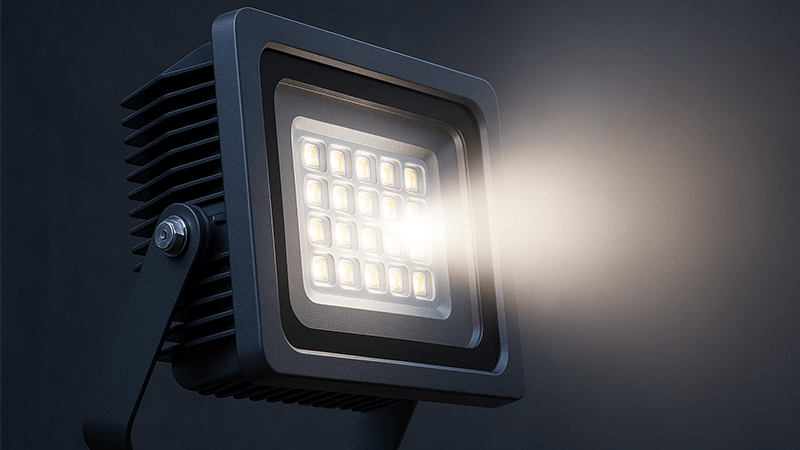
When I started my career in an LED factory, I learned that the claimed lifespan of a product tells you a lot about its quality. For large venues like outdoor arenas, replacing lights is a difficult and expensive job that often requires special equipment. So, choosing a fixture with a long, reliable lifespan is a smart investment. Unlike old bulbs that just burn out, LED lifespan is measured differently. It’s usually defined by an L70 rating, which is the point where the light output has decreased to 70% of its initial brightness. The LED will still work, but it will be dimmer.
What Determines Lifespan?
Three main components determine how long an LED floodlight will last. As a manufacturer, these are the areas where we focus our quality control.
- Heat Dissipation: Heat is the biggest enemy of LEDs. A well-designed heat sink, usually made of aluminum, is critical to draw heat away from the LED chips. Poor heat management will dramatically shorten the life of the chips and cause them to lose brightness much faster.
- LED Driver Quality: The driver is the power supply for the LEDs. It’s often the first component to fail in a low-quality fixture. We partner with reputable driver brands to ensure this component is as reliable as the LEDs themselves. A good driver also protects the LEDs from power fluctuations.
- LED Chip Quality: Not all LED chips are created equal. Chips from established brands have better efficiency and degrade much slower over time. Investing in better chips means the light will stay brighter for longer.
I helped a sports facility manager who was replacing his metal halide lights every two years. We installed our 50,000-hour rated LED floodlights. It’s now been six years, and they haven’t had to replace a single one. Their maintenance budget for lighting is now almost zero, and they saved a huge amount on energy bills too.
Conclusion
Successful arena lighting requires choosing the right lumens, proper wiring, using IP65-rated fixtures, and investing in durable products. This ensures safety, performance, and long-term value for any outdoor event.